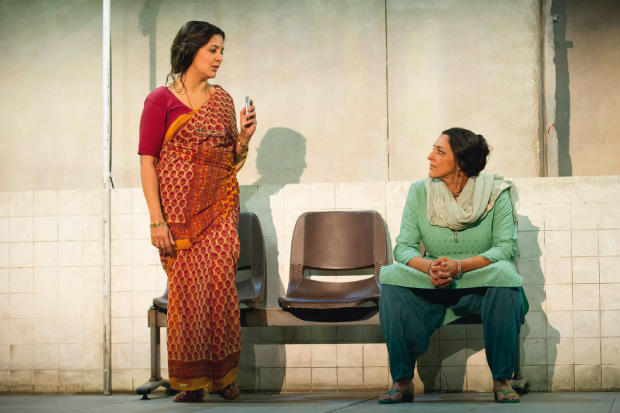Another Country was an instant response to Anthony Blunt’s exposure in 1979 as a Marxist spy. Julian Mitchell set out to explain how gay public-school toffs, reared in a system of hypocrisy and backstabbing, could betray their country. At a time when Soviet communism was a potent and growing menace, this issue grabbed play-goers by the throat. Today’s audiences will find different sources of topicality. The school system itself seems rather admirable and idyllic, if a little rough around the edges. The play could almost be a YouTube advert for Eton. All that’s missing is the ethnic kaleidoscope. There are no Indian or Chinese pupils, no Sikh bodyguards patrolling the grounds, no Filipino food-tasters tentatively sipping the turtle broth of a Saudi dauphin. It’s a Farageist fantasy of lithe white limbs and lively Anglo-Saxon minds discussing politics in oak-panelled studies over guiltless cigarettes. The boys have been trained to question and challenge absolutely everything, up to and including the ethos of the school itself. And it works.
Thirty years on, these costly crammers are thriving like never before, while Soviet communism has been well and truly Blunted. Jeremy Herrin’s solid production boasts an outstanding performance from company oldster Julian Wadham. He plays a suave, epigrammatic journalist, ‘a friend of Harold Nicolson’, who visits the school to road-test his latest aperçus and gather new stock for his harem. The young cast are good but not one of them struck me as especially memorable. Mind you, I thought the same thing when I first saw the play — and I’d been watching Rupert Everett and Kenneth Branagh.
A Small Family Business, by Alan Ayckbourn, is a cul-de-sac melodrama featuring a happy English clan who fall into the arms of a criminal syndicate. The opening scene is utterly inspired. Early evening. Hubbie returns home. Finds wife dolled up. Starts making love to her, unaware that friends and relatives are lying concealed behind the furniture ready to leap up for a surprise party. The potential of this situation is handled with top-drawer brilliance by Ayckbourn. After that, you might as well go home.
The comedy descends from its dizzying high wire, and the characters slither into the Ayckbourn comfort zone of carping, whining, wittering nitter-natter. Gosh, how they jabber. His favourite male type is the tool-shed creep, the lone fantasist with a hobby and a spanner. His women are either stupefied drudges or snippy snobs. But this ambitious play wants to transcend the sitcom genre and become a grand morality fable, on the Arthur Miller scale, and to carry us into the dark and tragic heart of human venality. But Ayckbourn can’t find the right notes without resorting to xenophobic shorthand. His agents of corruption are four Italian brothers, who wear silvery zoot suits and funny moustaches and speeka de Eengleesh and kissa de man onna de leeps. They also know how to dispose of a corpse for a consideration. These banalities are entirely unconvincing. As is the plot.
At a crucial moment a dishonest investigator declines a cash bribe and demands five times the sum offered. This is agreed; but while the surplus is being gathered he decides to abscond with a suitcase containing one fifth of the total he’s about to receive. Logic falters here but Ayckbourn makes the character act irrationally so a violent fight can ensue that will bring the script to its narrative peak. He succeeds in dragging the apparatus to the summit in the end, but at a lethal cost: believability. And the characters lack credible emotions. A cuckolded husband tells his brother that material possessions are an adequate compensation for his wife’s adultery. A car, a boat, a flashy watch with an added gizmo. But would a married man set such a low price on his sexual humiliation? He might, of course, if he were concealing something from himself, or from others. But no hidden layer exists. The character really is as truncated and infantalised as Ayckbourn presents him.
My guess is that Ayckbourn extends this view to his audiences and regards them as a pack of zombified Little Englanders content to accept his glib, selective doodles of suburban dim-wittery as some kind of national portrait. Adam Penford’s direction meets the modest challenges of the script. Nigel Lindsay is all right as the lead twerp but he’s too young for the role. His wife is played by Debra Gillett, who is too slim to play a character twice referred to as overweight. Nicky Wardley does a lovely turn as a drawling seductress who keeps the Italians on the boil. (Being Italians they’re sex-mad, of course.) What a perverse show this is: a story of decent Home Counties folk brought low by thieving migrants who breed like rabbits. Yup. It’s another one for Nigel Farage.







Comments